
- Автоматизация
- Антропология
- Археология
- Архитектура
- Биология
- Ботаника
- Бухгалтерия
- Военная наука
- Генетика
- География
- Геология
- Демография
- Деревообработка
- Журналистика
- Зоология
- Изобретательство
- Информатика
- Искусство
- История
- Кинематография
- Компьютеризация
- Косметика
- Кулинария
- Культура
- Лексикология
- Лингвистика
- Литература
- Логика
- Маркетинг
- Математика
- Материаловедение
- Медицина
- Менеджмент
- Металлургия
- Метрология
- Механика
- Музыка
- Науковедение
- Образование
- Охрана Труда
- Педагогика
- Полиграфия
- Политология
- Право
- Предпринимательство
- Приборостроение
- Программирование
- Производство
- Промышленность
- Психология
- Радиосвязь
- Религия
- Риторика
- Социология
- Спорт
- Стандартизация
- Статистика
- Строительство
- Технологии
- Торговля
- Транспорт
- Фармакология
- Физика
- Физиология
- Философия
- Финансы
- Химия
- Хозяйство
- Черчение
- Экология
- Экономика
- Электроника
- Электротехника
- Энергетика
3In the background, you can see more children. Behind her, on the left of the photo, there is a notice board.
4 You can see t h em clearly, the children I mean. She must be good at her job, I think.
P SKILLS BUILDER 47
4 3. 18 Pronunciation Listen and repeat the sentences. Notice the intonation at the end of the sentences.
5 Complete the sentences.
1 The teacher is fifty and the student about fifteen. She looks experienced, the teacher I mean.
2 It could be a theatre, or like that.
3 She looks a nice person, I .
4 The police officer is arresting the man. He looks worried, the I mean.
b
6 Describe the man in photo b.
P SKILLS BUILDER 47
1 Look at the photo and write notes about the things below:
• where it is
• who is in the photo
• what else you can see in the photo (e. g. in the background)
• what is happening now
• what has happened before
• what is going to happen next
2 P SKILLS BUILDER 48 Read the strategies in the Skills Builder for how to keep talking.
Practise saying sentences.
3 Work in pairs. Ask and answer questions about the two photos.
7 Tell the class your guesses about the photo. Then check them on page 129.
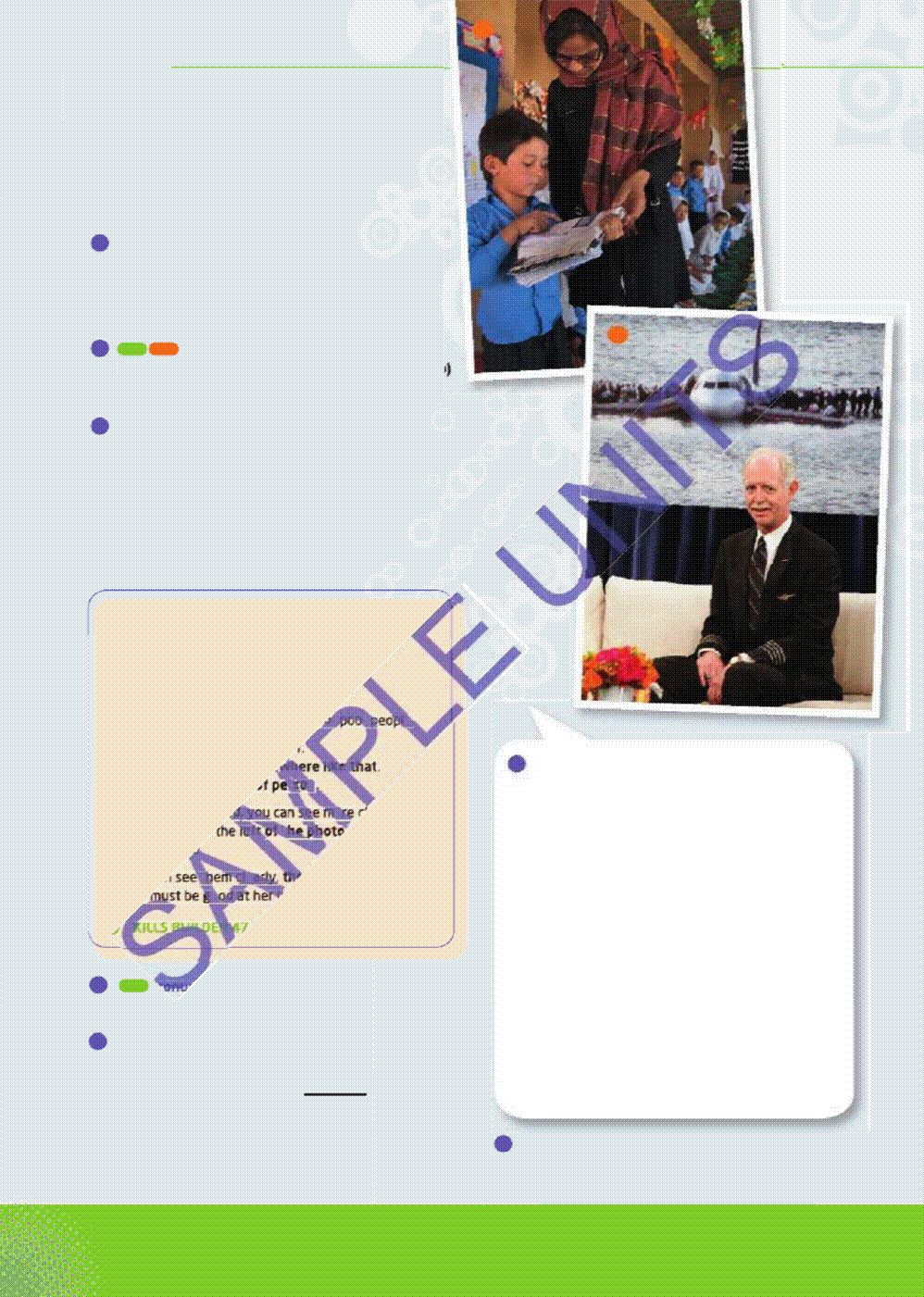
LEARNING LINKS: 1 Read and listen to an extract from Jane Eyre in Culture Choice 3 on page 106.
Then do a project about a fictional hero or heroine from your country.
52 2 Check Your Progress 6 ➜ MyLab / Workbook page 53.
3 Exam Choice 3 ➜ MyLab / Workbook pages 54–56. Complete the Module Diary.
| |
L
U
D
O
M
LEARNING
Objectives: Listen, read and talk about learning and schools; write a blog post with your opinions;
learn more about taking part in conversations; learn more about reported statements.
a c
b
TOPIC TALK
1 Look at the photos (a–c). Find the activities in the network and add more school subjects.
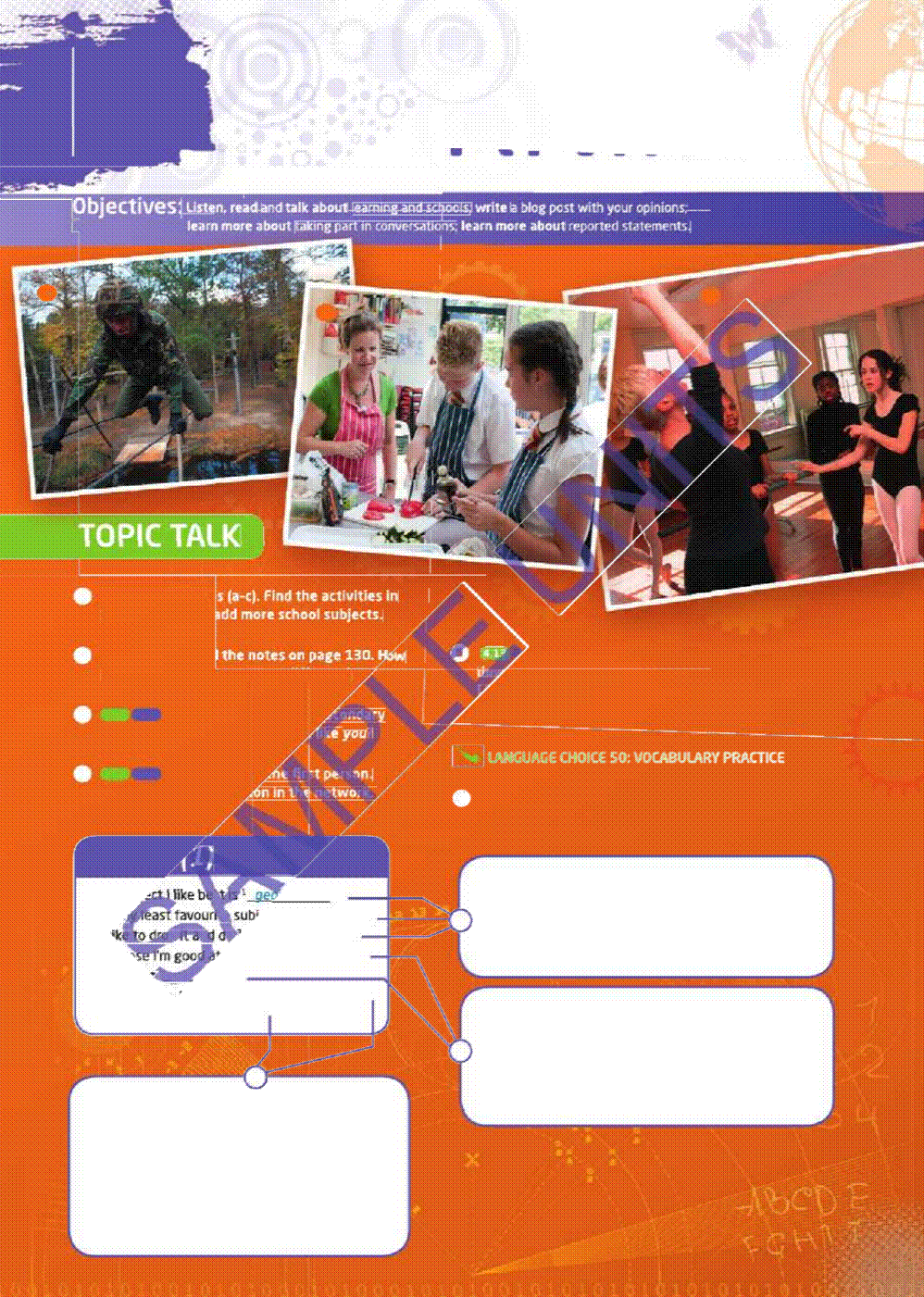 2 Your Culture Read the notes on page 130. How is education in your country diff erent?
2 Your Culture Read the notes on page 130. How is education in your country diff erent?
3 4. 9 4. 10 Listen to three English secondary students. Which of them is most like you ?
4 4. 11 4. 12 Listen again to the fi rst person. Complete the information in the network.
School (1)
The subject I like best is 1 geography .
And my least favouri te subject is 2 . I’d like to dro p it and d o 3 instead.
I suppose I’m good at 4 but I’m not so good at 5 _ .
Outside class, I 6 and 7 . It’d be great to 8 .
Extra–curricular activities
belong to the cadets (army), choir, debating club, film club, orchestra, poetry club
do adventure activities, astronomy, chess, climbing, dancing, painting, sport, voluntary work
learn about carpentry, cookery, first aid/life saving, personal finance,
write for the school magazine
5 4. 13 Pronunciation Listen to the sentences and write down the contractions. Then write out the full forms. Listen again and repeat the sentences.
It’d be (it would be) great.
6 Work in groups. Use the network to talk about your
learning.
Subjects
art and design, business studies, citizenship, drama, economics, English language/literature, geography, ICT (information and computer technology), philosophy, politics, religious education, technology
Learning skills
analysing information/ideas, assessing my progress, concentrating in class, memorising facts/numbers/ ideas/images, organising my learning, passing exams, presenting work neatly, solving problems, working in teams, working online
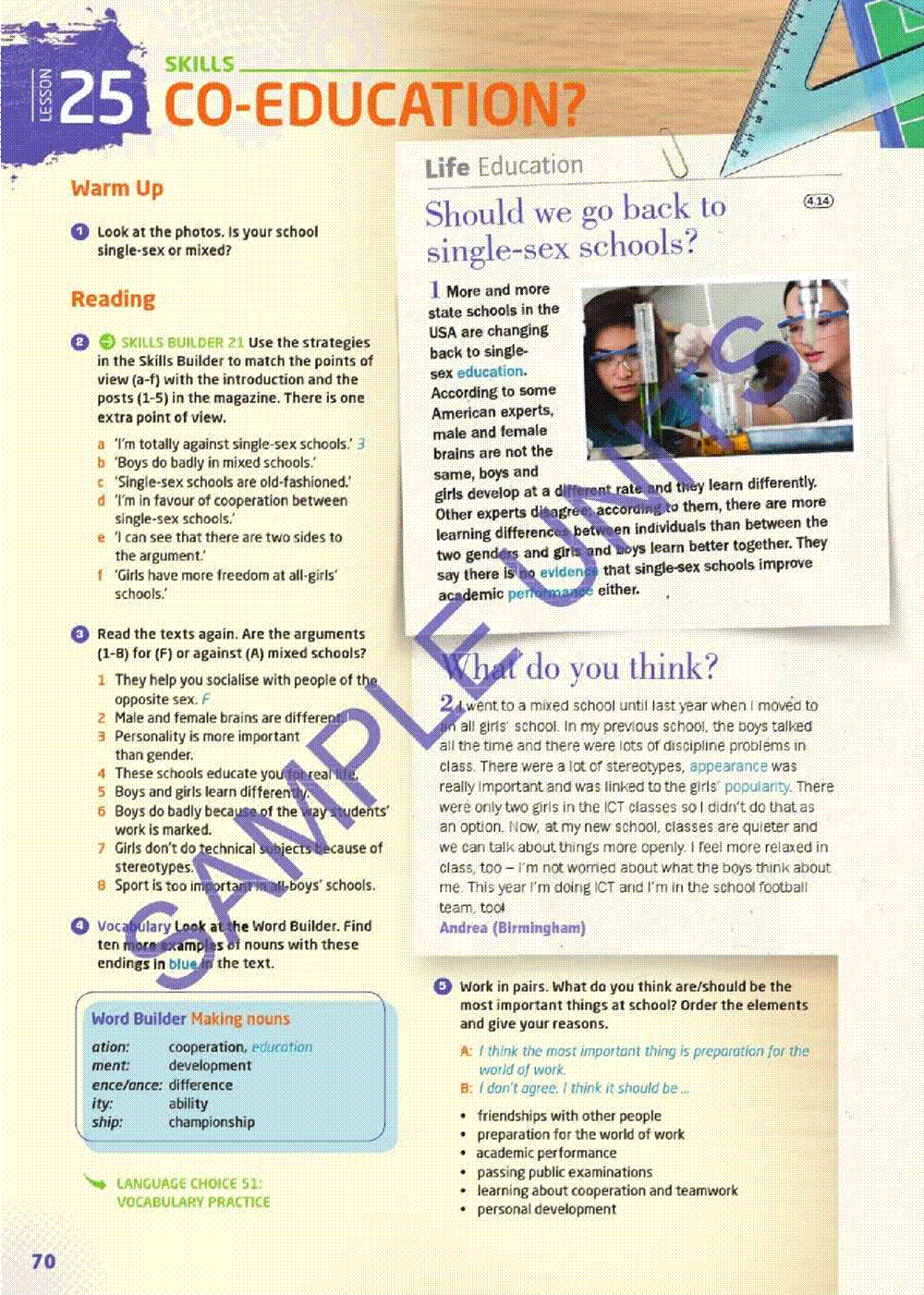
9 LEARNING
‘ The boys talked all the
time and there were lots of
discipline problems. ’
Writing
 6 Look at the Sentence Builder. How do you say the words in bold in your language?
6 Look at the Sentence Builder. How do you say the words in bold in your language?
Sentence Builder Example linkers
1 For example, I have more in c omm on with girls.
2 They are obsessed with sports such as football.
3 They don’t learn to socialise, like a friend of mine who is very shy with girls.
P SKILLS BUILDER 35
3 I’m at a mixed school and I’m against single-
sex classes. I think that it’s not your gender that’s important but your personality. I think it's important to have friendships with both boys and girls. For example, I have more in common with two or three girls I know than with lots of boys. I think male single-sex schools are dull, too because they are obsessed with sports such as football, cricket and rugby and I’d hate that! Guys at all-boys’ schools don’t learn to
socialise with girls, like a friend of mine who dies of embarrassment every time he meets a girl. I wouldn’t like to be like him! So I’m in favour of mixed education because it educates you for life. Simon (Cardiff)
4 I go to a mixed school but most of my teachers are women. In some subjects, I don’t get such good marks because my work is not very neat and my handwriting is terrible – I don’t think that is very fair. We have lots of project work, too but I’d prefer to have examinations as I do better in them. Also, among the boys in my class studying is considered a ‘girly’ thing. If you do well at something, the others laugh at you. I think I’d do better at an all-boys' school.
Alan (Ipswich)
5 I go to a girls’ school but there’s a boys’ school
next door. I think it’s the best kind of arrangement because we have lots of social events together but we study separately.
Carol (Liverpool)
7 Complete these sentences about your life.
1 I am interested in subjects such as .
2 I don’t enjoy subjects like .
3 I would like to study other subjects at school. For example, .
4 I have to do things for homework such as .
5 We do activities outside class like .
8 Choose the kind of education you are in favour of (a–d). Think of arguments for it.
You learn to socialise with the opposite sex.
a single-sex schools b mixed education
c single-sex classes in a mixed school
d two single-sex schools that work together
9 Use your notes to write a blog post like those above. Use the expressions below and give examples to support your arguments.
I’m in favour of … because …
I’m against … because …
10 Work in groups. Read each others’ posts. What do you think? Tell the class.
We’re all in favour of mixed education because...
No Comment
‘Education is not the fi lling of a bucket but the lighting of a fi re. ’
W. B. Yeats, Irish poet
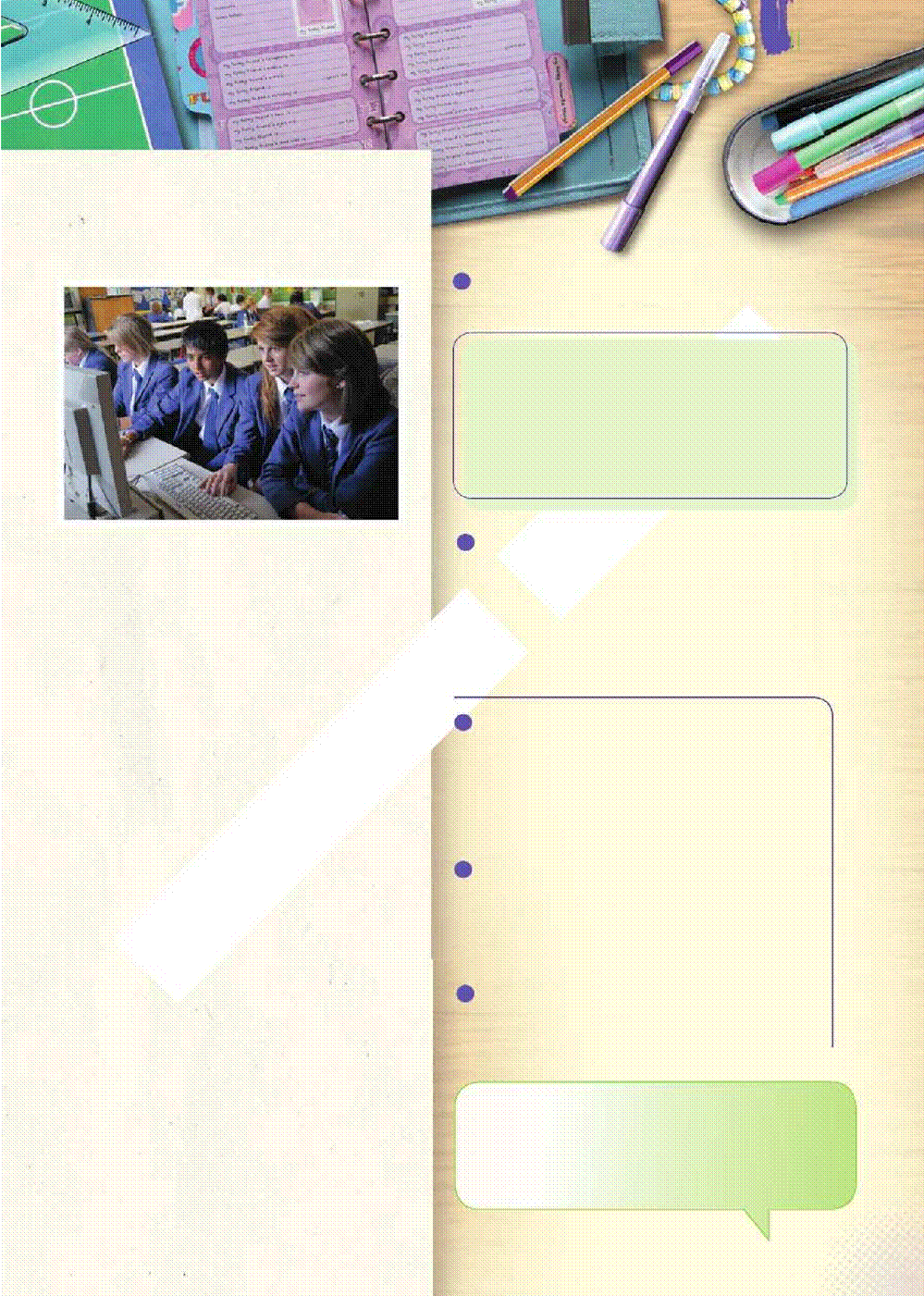
|
O
S
S
E
L
BRAIN POWER
Warm Up
1 Look at the photos (a–c) on page 73. Which of the people are doing something good for their brain?

 Read the online forum. Were your guesses correct? What tips about brain power have you learned?
Read the online forum. Were your guesses correct? What tips about brain power have you learned?
How well do you look after your brain? What good and bad things do you do?
Reported statements
 List the verbs in bold from the text that people use to report people’s words, thoughts or actions.
List the verbs in bold from the text that people use to report people’s words, thoughts or actions.
believe, …
 Read the sentences and see how they are reported in the text. When does the tense of the original sentence change?
Read the sentences and see how they are reported in the text. When does the tense of the original sentence change?
Junk food is bad for the brain.
➜ Scientists claim (that) junk food is bad for the brain.
Caffeine and alcohol kill brain cells.
➜ My grandmother thought (that) caffeine and alcohol
killed brain cells.
 Write the reported sentences from the text. Name the verb forms.
Write the reported sentences from the text. Name the verb forms.
1 Oily fish is the best brain food. (Present Simple) She thought that oily fish was the best brain food. (Past Simple)
2 We don’t produce new brain cells. (Present Simple)
3 These kids are getting poor results in memory tests. (Present Continuous)
4 He didn’t make any big discoveries on the run. (Past Simple)
5 The rats can’t solve problems that they have already solved. (Present Perfect)
6 Negative people will make you depressed. (will)
7 The rats can’t solve problems. (can)
 Read the sentences (1–2) from the text. What were the original sentences? How did the pronouns in bold change?
Read the sentences (1–2) from the text. What were the original sentences? How did the pronouns in bold change?
1 He admitted that he hadn't made any big discoveries but said that running helped his mind relax.
2 My granddad always warned me that negative people would make me depressed.
‘I've read somewhere that there are ways
 to increase brain power. Any tips on that? I
to increase brain power. Any tips on that? I
really have to make my brain work at its best to revise before the exams. ’
Replies
 Jessica posted 12 April 23: 10
Jessica posted 12 April 23: 10
1 Go jogging! Until recently, scientists believed that new brain cells were
not produced after we were born but actually, physical exercise stimulates the growth of new brain cells. Running or aerobics can increase your concentration and learning ability. My science teacher said running gave him time to think. He admitted that he hadn't made any big discoveries on the run but said that running helped his mind relax.
 Dmitri posted 12 April 22: 57
Dmitri posted 12 April 22: 57
2 Get more sleep. Lack of sleep does awful things to your concentration and
learning ability. Scientists claim that after 21 hours without sleep (or three late nights and early mornings) our brain works similarly to someone who is drunk. When we sleep, the brain processes new information and even solves problems. The Russian chemist Mendeleev ‘invented’ the periodic table in a dream.
 Jonathan posted 12 April 17: 28 3 You should always eat breakfast. But watch what you eat! Scientists studied
Jonathan posted 12 April 17: 28 3 You should always eat breakfast. But watch what you eat! Scientists studied
kids who usually had fizzy drinks and sugary snacks for breakfast. After the study they announced that these kids were getting the same results as 70-year-olds in memory tests. My grandmother thought caffeine and alcohol killed brain cells. She often told me that oily fish, like salmon or tuna, was the best brain food and she was right. Also, scientists claim that junk food
is bad for the brain. I recently read about an experiment on rats that were given only junk food to eat. The authors said that the rats couldn't solve problems that they had already solved before.
 Maria posted 11 April 12: 02
Maria posted 11 April 12: 02
4 Being happy and positive helps the brain so find friends who have a good sense
of humour and avoid people who complain. My granddad always warned me that being with negative people would make me depressed.


c 9 LEARNING
a
Grammar Alive Reporting (1)
b
She said that she was interested in brain chemistry.
2 I failed some tests in primary school. (She admitted ... )
3 My team have done lots of work. (She reported ... )
4 We’re going to study emotions. (She says ... )
5 There will be more and more research into abstract thinking. (She believes ... )
6 I’m working on learning styles. (She told us ... )
7 I don’t remember people’s names. (She admitted ... )
8 Alcohol can cause brain damage. (She warned ... )
LANGUAGE CHOICE 53
10 4. 16 Listen to an in te rvie w w i th Brian, talkin g about speed l e arning. Which of the r eported statements below are corre c t? Correct the ones which are not.
1 Br i a n sai d they had started many years earlier.
incorrect – Brian said they had started three years earlier.
2 Brian said they trained over ten thousand people a year.
3 Brian said they taught people how to concentrate more effectively.
4 Brian said that we couldn’t improve our learning ability.
5 Brian said they were interested in memory.
6 Brian said they had worked out a memory training programme.
7 Brian said they had three new courses on offer.
|
She said that she slept too little and that she drank too much coff ee.
12 Work in pairs. Write three sentences about your true or made-up achievements, habits, interests, etc. Share them with your par tner.
I am learning Russian. I’ve won a song contest. I am a fast reader.
13 Work with another person. Report to them what your previous
partner said.
She said she was learning Russian. She said she had won a song contest. She claimed she was a fast reader.
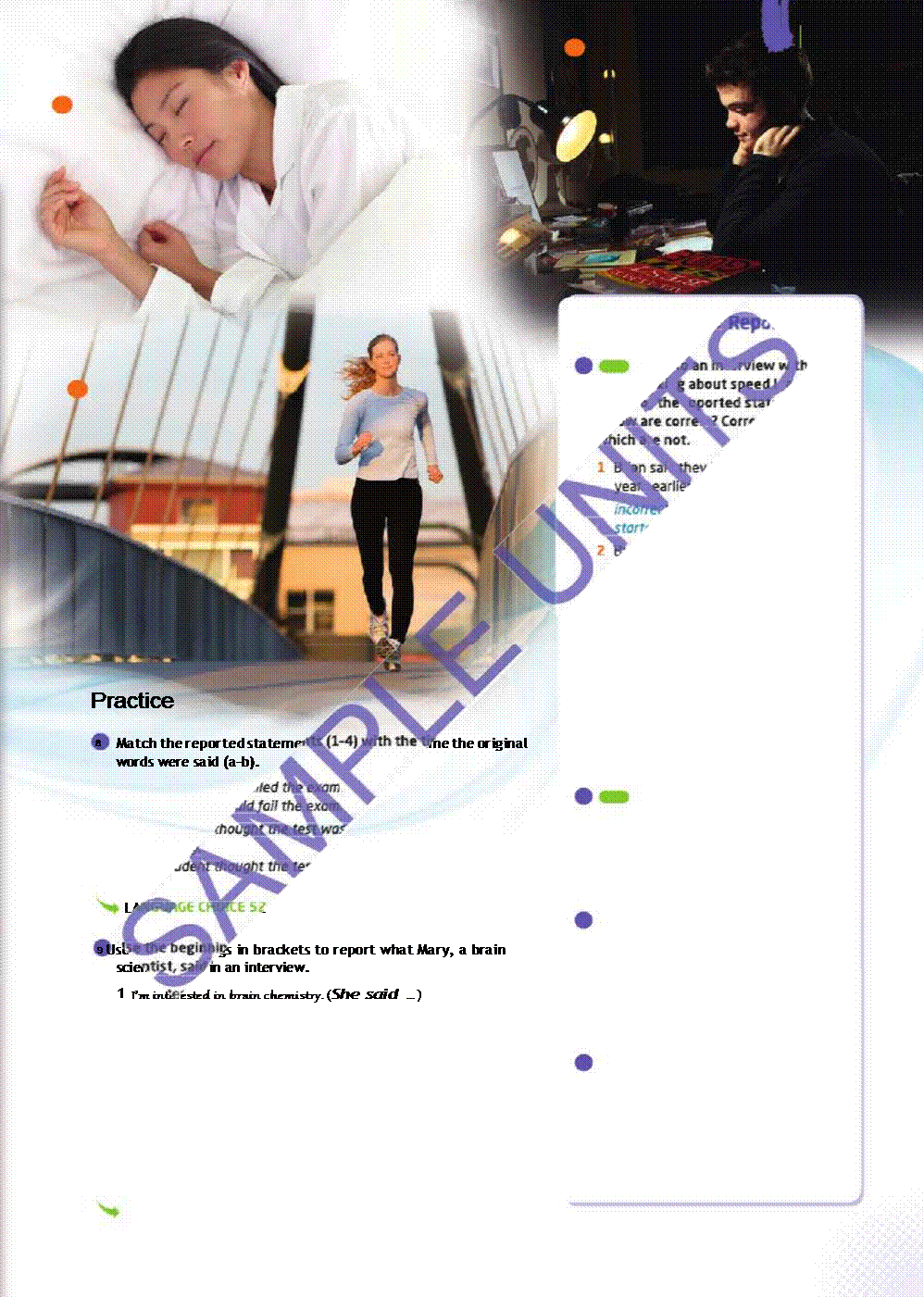
| |
O
S
S
E
L
SKILLS
SCHOOL LIFE
DVD Choice
4 DVD 9 Watch the extract from a BBC programme without sound and order the
Warm Up
1 Vocabulary Use the vocabulary network to answer the questions.
1 What sort of school do you go to?
2 What facilities has your school got?
3 What equipment have your classrooms got?
4 What is the atmosphere in your school like?
5 Which rules do you have at your school?
events (a–e). Watch the extract with sound and check your guesses.
a The teacher gives him a punishment.
b Dennis doesn’t hand in his homework.
c Dennis is having breakfast and listening to the radio.
d Dennis makes a joke.
e His notebook catches fire on the toaster.
5 DVD 9 Watch again. Are the sentences true (T) or false (F)?
Atmosphere:
competitive, friendly,
laid-back, lively, noisy, relaxed, serious, sociable, strict Problems:
aggressive behaviour, bullying, fighting,
SCHOOL (2)
Rules:
arrive on time, attend school daily, hand in homework on time, leave personal items at home (e. g. phones), no hats/ hoods/jewellery,
wear a uniform
Schools:
UK: primary (4/5–11), secondary (e. g. comprehensive school) (11–18), sixth-form college (16–18)
US: elementary school (5–11), middle school (11–14), high school (14–18)
Facilities:
science/computer/language lab, sports hall/gym, the a tre/ assembly hall, lib ra ry Equipment:
computers, project or s a n d screens, high-speed int er net access/wi-fi
1 The radio news was about an asteroid that might hit the Earth. T
2 The teacher gets very angry because of Dennis’s excuse.
3 The teacher makes Dennis do extra homework.
4 The teacher will not punish Dennis if the world ends at 3. 20 because of the asteroid.
5 The teacher is in a bad mood because he has had too much coffee.
6 Has anything ever happened to your homework? Did your teacher believe you? What is the funniest excuse you have heard in class?
LANGUAGE CHOICE 54: VOCABULARY PRACTICE
Listening
2 4. 18 4. 19 Work in pairs. Listen to two exchange students (Alice and Polly) talking about their schools. Student A answers the questions in Exercise 1 for Alice.
Student B answers the questions for Polly.
3 4. 18
4. 19 Listen again and answer the
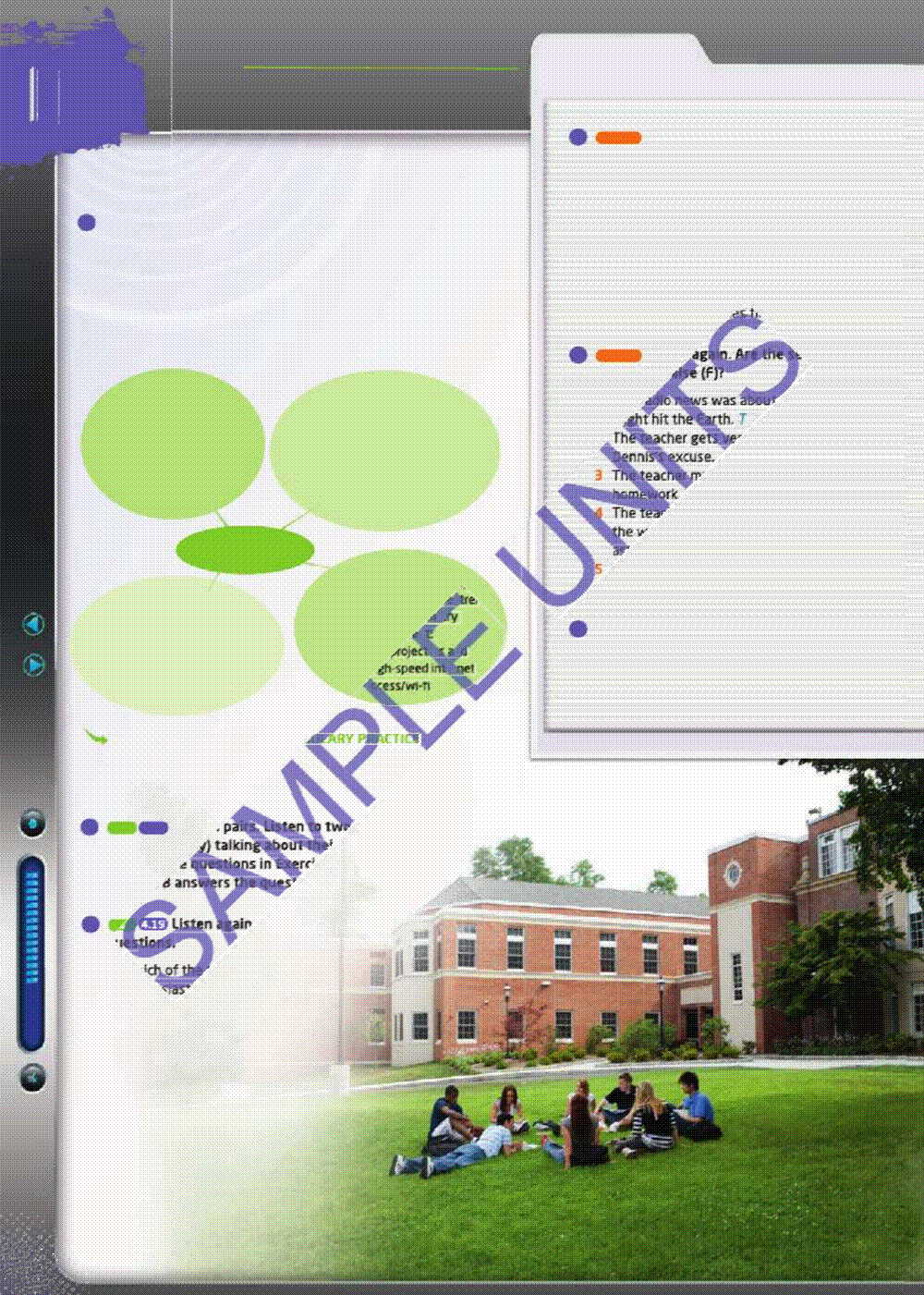 questions.
questions.
1 Which of the two girls is more enthusiastic about her school?
2 What are the girls’ favourite extra–curricular activities?
3 Where do Polly’s ideas about US high schools come from?
4 What kind of problems were there in Alice's old school?
5 What is Polly surprised about?
6 What are they both looking forward to?
9 LEARNING
8 Look at the Talk Builder. Which of the expressions (a or b) are more formal?
Talk Builder Asking for permission
1 Attract attention:
a Excuse me, Miss Roberts. b Hey, Katie!
2 Ask to speak to someone:
a I want to speak to you. b Could I possibly have a word with you, please?
3
|
 a Can I... ? /Can’t I... ? b Would it be all right if I........................................................................................................................................................... ? / Is it
a Can I... ? /Can’t I... ? b Would it be all right if I........................................................................................................................................................... ? / Is it
okay if I........... ?
4 Refuse permission:
a Sorry. b I am sorry but...
5 Give permission:
a Oh, all right. b Yes, you can do that.
6 Try to end a conversation:
a I’m sorry but I really must be goi n g. b Look, I’ v e really got to go.
7 Say goodbye:
a Bye, see you. b Goodbye. See you o n Monday.
P SKILLS BUILDER 52
9 4. 21 Listen and repeat the questions and replies. Notice the intonation.
10 Complete the dialogues with words and expressions from the Talk Builder.
A: 1 Excuse me , Mr Smith. Could I possibly 2 with you,
Watching and Speaking
7 4. 20 DVD 10 P SKILLS BUILDER 9 Use the strategies in the Skills Builder to
listen to or watch two dialogues and match the people with their intentions (1–7). There is one extra intention.
• Jamie (J) • Miss Roberts (MR) • Katie (K)
1 doesn’t want to help the other person K
2 wants to borrow something
3 needs to get to a class
4 wants to invite someone to a match
5 wants to get to a meeting
6 wants more time for a project
7 wants to arrange to meet
please? I need more time for my maths homework. 3
all right if I handed it in tomorrow?
B: Yes, you 4 that. I’m 5 I really must be going.
C: 6 , Sam. I want to speak to you. 7 borrow your dictionary?
D: 8 , Annie. It’s at home.
C: Well, 9 come round and get it?
D: Oh, 10 .
11 Work in pairs. Act out the dialogues above. Change the things to ask for.
12 Choose two situations to act out – one from each list (1–2). Think of imaginative reasons.
1 You want permission from your teacher to: a miss an exam. b leave school early. c use a computer in an exam.
2 You want to:
a use a friend’s computer.
b borrow a schoolmate’s laptop.
c come to his/her house to study together.
13 Work in pairs. Act out the dialogues. Make it diffi cult for your partner!
A: Is it all right if I arrive late?
B: Why are you going to be late? I’m sorry but …
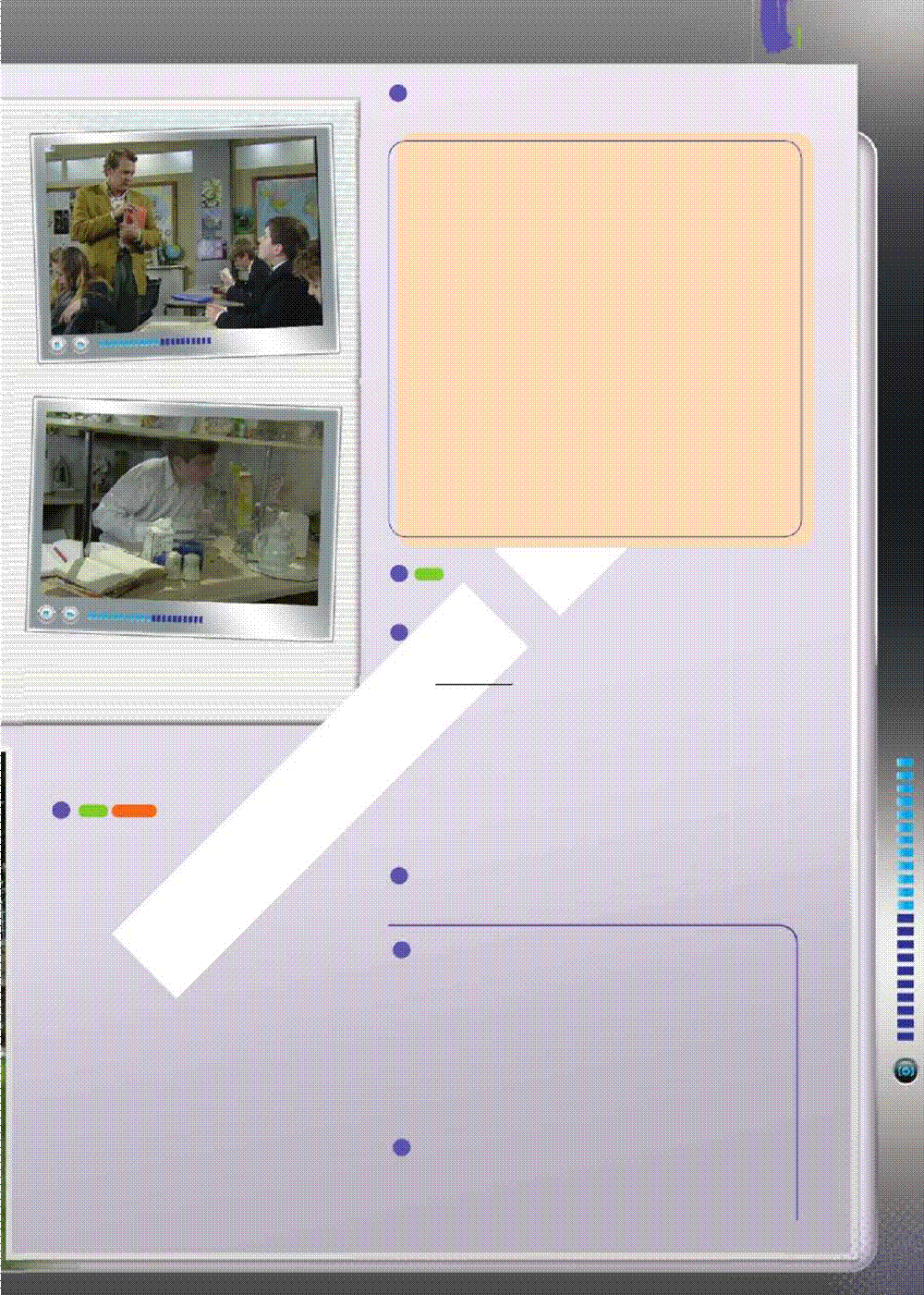
Language Review Modules 8 and 9
1 Environment/School Complete the texts with the correct words.
I live in a subtropical 1 and the temperature never drops 2 freezing. The biggest problem is traffic and air 3 and this causes health problems. I think people should use their cars less and I always try to walk or 4 everywhere.
 I go to a big secondary school which is very friendly.
I go to a big secondary school which is very friendly.
The only thing I don’t like is that we have to wear a 5 . At school, I do well at science and the
6 I like best is biology. However, I’d like to
drop PE and do drama 7 . Outside class, I do debating. It’d be 8 to learn cookery because it is so useful. /8
2 take /Making nouns Complete the text with the correct form of the words in brackets and prepositions where needed.
I go to an experimental school with no classes or teachers – the adults are ‘advisers’ who 9 (take care) our learning. The first big 10 (differ) from other schools is that there are no classrooms but one big room with the 11 (appear) of a modern office. Students can 12 (take part) group projects and can also 13 (take break) when they want. There are no compulsory 14 (exam) but the students' academic 15 (perform) is above average for the USA. I like the school because it is a more creative type of 16 (educate). If you 17 (take advantage) the school you learn a lot, like 18 (cooperate) with other peo p le.
/10
3 Cause linkers/Example linker s/ Reduc e d relative clauses Join sentences 19–23 using the w ords in brackets. Re-write sen t e nces 24–26 a s reduced relative clauses.
19 There is a lot o f pollution. It is caused by exhaust fumes from cars. (due to)
20 Forest fires ar e inc r easing. The reason for this is climate change. (because of )
21 I always w a lk eve r ywhere. I have not got a car. (as )
22 We s hould find new ways to save energy. Car sharing is one example. (such as )
23 I am in favour of renewable energies. Solar energy is one type. (like)
24 There are a lot of accidents on that road. The accidents are happening because people drive too fast.
25 Scientists have produced a new report. The scientists are working on climate change.
26 People consume twice as much energy as those in the UK. These people are living in the USA.
/8
4 Future Continuous Complete the dialogue with the Future Continuous form of the verb in brackets.
A: You’re going on holiday tomorrow? Lucky you!
B: Yes, we 27 (leave) the house at 6. 30.
A: What time 28 (you arrive) in New York?
B: Tomorrow afternoon. This time tomorrow 29
(we walk) around Manhattan.
A: 30 (you go) to the NBA shop?
B: Yes, 31 (I definitely go) there! /5
5 Pronouns Complete the sentenc e s with myself, ourselves, himself or each o t er (x 2).
32 I got up and looked at______________________________________ in the m i r ror.
33 We painted the bedrooms a t home .
34 My neighbours are friendly and we help .
35 My brother hurt when he fell over.
36 We have known _ s ince we were four. /5
6 Reported statements Report the statements below. 37 ‘I’m good at remembering dates. ’ (He said .......................................................................................................................................................................................................................................................................................... )
38 ‘I have never failed an exam. ’ (She told us )
39 ‘N ot sleeping can be unhealthy. ’ (He warned … ) 40 ‘Th e re will be more computers. ’ (He believes … ) 41 ‘I'm bad at doing homework. ’ (He admitted … )
42 ‘ICT is going to be important. ’ (He told us ... ) /6
7 Agreeing and disagreeing (2)/Asking for permission Complete the dialogues.
A: Excuse me. Could I 43 have a word with you? 44 it be all right if I used a computer in the exam?
B: I am 45 but we don’t usually allow that.
A: But I hurt my finger. Is it 46 if I use one
just this time?
A: I think ICT classes are great, 47 you?
B: No, I don’t think 48................. They’re not interesting.
Don’t you agree?
A: No, I 49 .
B: But maths is more useful. Don’t you think 50 ?
/8
Self Assessment
4. 22 Listen and check your answers. Write down the scores. Use the table to fi nd practice exercises.
Exercise If you need practice, go to
1 Language Choice 43 and 50
2 Language Choice 46 and 51
3 SB p. 67 ex. 5, p. 71 ex. 7; Language Choice 47
4 Language Choice 44
5 Language Choice 48 and 49
6 Language Choice 52 and 53
7 SB p. 68 ex. 5, p. 75 ex. 10

LEARNING LINKS: 1 Check Your Progress 9 ➜ MyLab / Workbook page 81. Complete the Module Diary.
76 2 Sound Choice 5 ➜ MyLab / Workbook page 82. Choose three pronunciation activities to do.
|
|
|
© helpiks.su При использовании или копировании материалов прямая ссылка на сайт обязательна.
|